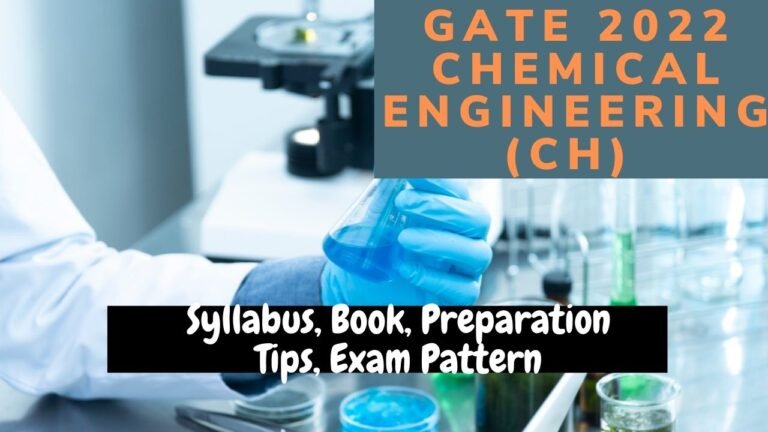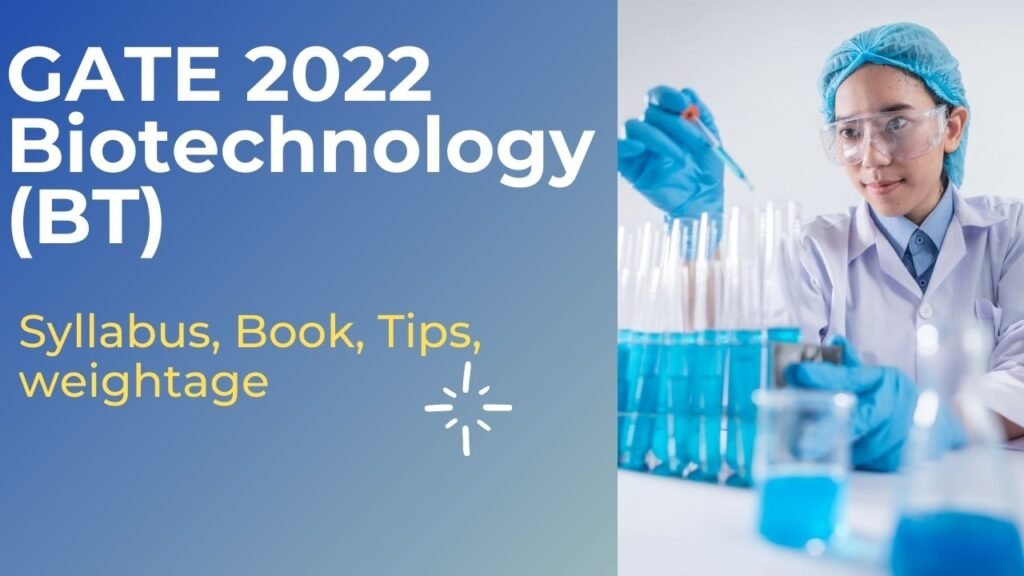GATE 2022 Chemical Engineering Syllabus, Book, Preparation Tips, Exam Pattern

The GATE 2022 Chemical Engineering Syllabus has been updated and is now divided into 9 parts, each of which includes a number of subtopics. The chemical and mathematical engineering syllabus receives 85% of the weightage in this GATE 2021 paper, with the remaining 15% going to the General Aptitude syllabus, which is common to all branches. GATE 2022 Chemical Engineering Syllabus
- You can also appear for a maximum of two papers starting this year. Candidates who are preparing to take CH can additionally take CY, PE, or XE. Check Exam Pattern for GATE 2022
- One of the most popular engineering fields among students is chemical engineering. The branch transforms energy and materials into useful goods by applying basic chemistry, physics, and math concepts. Engineering mathematics, Process Calculations, Heat Transfer, and other topics are covered in the curriculum.
GATE 2022 Chemical Engineering Syllabus
Section 1: Engineering Mathematics
Linear Algebra:
- Matrix algebra, Systems of linear equations, Eigen values and eigenvectors.
Calculus:
- Functions of single variable, Limit, continuity and differentiability, Taylor series, Mean value theorems, Evaluation of definite and improper integrals, Partial derivatives, Total derivative, Maxima and minima, Gradient, Divergence and Curl, Vector identities, Directional derivatives, Line, Surface and Volume integrals, Stokes, Gauss and Green’s theorems.
Differential equations:
- First order equations (linear and nonlinear), Higher order linear differential equations
with constant coefficients, Cauchy’s and Euler’s equations, Initial and boundary value problems, Laplace transforms, Solutions of one dimensional heat and wave equations and Laplace equation.
Complex variables:
- Complex number, polar form of complex number, triangle inequality.
Probability and Statistics:
- Definitions of probability and sampling theorems, Conditional probability, Mean, median, mode and standard deviation, Random variables, Poisson, Normal and Binomial distributions, Linear regression analysis.
Numerical Methods:
- Numerical solutions of linear and non-linear algebraic equations. Integration by
trapezoidal and Simpson’s rule. Single and multi-step methods for numerical solution of differential equations.
Section 2: Process Calculations and Thermodynamics
- Steady and unsteady state mass and energy balances including multiphase, multi-component, reacting and nonreacting systems. Use of tie components; recycle, bypass and purge calculations; Gibb’s phase rule and degree of freedom analysis.
- First and Second laws of thermodynamics. Applications of first law to close and open systems. Second law and Entropy. Thermodynamic properties of pure substances: Equation of State and residual properties, properties of mixtures: partial molar properties, fugacity, excess properties and activity coefficients; phase equilibria: predicting VLE of systems; chemical reaction equilibrium.
Section 3: Fluid Mechanics and Mechanical Operations
- Fluid statics, surface tension, Newtonian and non-Newtonian fluids, transport properties, shell-balances including differential form of Bernoulli equation and energy balance, equation of continuity, equation of motion, equation of mechanical energy, Macroscopic friction factors, dimensional analysis and similitude,
- Flow through pipeline systems, velocity profiles, flow meters, pumps and compressors, elementary boundary layer theory, flow past immersed bodies including packed and fluidized beds, Turbulent flow: fluctuating velocity, universal velocity profile and pressure drop.
- Particle size and shape, particle size distribution, size reduction and classification of solid particles; free and hindered settling; centrifuge and cyclones; thickening and classification, filtration, agitation and mixing; conveying of solids.
Section 4: Heat Transfer
- Equation of energy, steady and unsteady heat conduction, convection and radiation, thermal boundary layer and heat transfer coefficients, boiling, condensation and evaporation; types of heat exchangers and evaporators and their process calculations;
- Design of double pipe, shell and tube heat exchangers, and single and multiple effect
evaporators.
Section 5: Mass Transfer
- Fick’s laws, molecular diffusion in fluids, mass transfer coefficients, film, penetration and surface renewal theories; momentum, heat and mass transfer analogies; stage-wise and continuous contacting and stage efficiencies.
- HTU & NTU concepts; design and operation of equipment for distillation, absorption, leaching, liquid-liquid extraction, drying, humidification, dehumidification and adsorption, membrane separations
- (microfiltration, ultra-filtration, Nano-filtration and reverse osmosis).
Section 6: Chemical Reaction Engineering
- Theories of reaction rates; kinetics of homogeneous reactions, interpretation of kinetic data, single and multiple
- Reactions in ideal reactors, kinetics of enzyme reactions (Michaelis-Menten and Monod models), non-ideal reactors; residence time distribution, single parameter model; non-isothermal reactors; kinetics of heterogeneous catalytic reactions; diffusion effects in catalysis; rate and performance equations for catalyst deactivation
Section 7: Instrumentation and Process Control
- Measurement of process variables; sensors and transducers; P&ID equipment symbols; process modeling and linearization, transfer functions and dynamic responses of various systems, systems with inverse response, process reaction curve, controller modes (P, PI, and PID); control valves; transducer dynamics;
- Analysis of closed loop systems including stability, frequency response, controller tuning, cascade and feed forward control.
Section 8: Plant Design and Economics
- Principles of process economics and cost estimation including depreciation and total annualized cost, cost indices, rate of return, payback period, discounted cash flow,
- Optimization in process design and sizing of chemical engineering equipment such as heat exchangers and multistage contactors.
Section 9: Chemical Technology
- Inorganic chemical industries (sulfuric acid, phosphoric acid, chlor-alkali industry), fertilizers (Ammonia, Urea, SSP and TSP); natural products industries (Pulp and Paper, Sugar, Oil, and Fats); petroleum refining and petrochemicals; polymerization industries (polyethylene, polypropylene, PVC and polyester synthetic fibers).
Weightage of Important Topics from GATE 2022 CHEMCAL ENGINEERING Syllabus
From General Aptitude
| Topic | Weightage (Marks) |
|---|---|
| Grammar | 2 |
| Sentence Completion | 2 |
| Synonyms and Antonyms | 4 |
| Sentence Completion | 2 |
| Reasoning Ability | 4 |
| Data Interpretation | 2 |
| Numerical Method | 5 |
Weightage of Main Sections
| Topic | Weightage (Marks) |
|---|---|
| Fluid Mechanics | 15 |
| Heat and Mass Transfer | 20 |
| Plant Design | 5 |
| Chemical Technology | 12 |
GATE 2022 Chemical Engineering Exam Pattern
Before beginning with Chemical Engineering preparation, applicants must go through the exam format and marking scheme. The exam pattern will give you a good sense of the types of questions that will be asked, the total number of marks that will be awarded, the length of the exam, and so on. The following is the exam pattern and marking method for candidates to review: GATE 2022 Chemical Engineering Syllabus
- Mode of Examination – Online
- Duration – 3 hours.
- Type of Questions – MCQs, MSQs, and NATs.
- Total Questions – 65
- Total marks – 100
- The GATE Syllabus is organised according to the level of graduation.
- For 1 mark MCQs, 1/3 marks will be deducted for every wrong answer.
- Likewise, for 2 marks MCQs, 2/3 marks will be deducted.
Marking Scheme
| Section | Distribution of Marks | Total Marks | Types of questions |
|---|---|---|---|
| General Ability | 5 questions of 1 mark each 5 questions of 2 marks each | 15 marks | MCQs |
| AG (Subject Syllabus) + Engineering Mathematics | 25 questions of 1 mark each 30 questions of 2 marks each | 85 marks | MCQs and NATs |
Important GATE 2022 Chemical Engineering Books
GATE 2022 Chemical Engineering Books
For Engineering Mathematics
| Books | Author/Publisher |
|---|---|
| GATE Engineering Mathematics for All Streams | Abhinav Goel and Suraj Singh, Arihant Publication |
| Higher Engineering Mathematics | B.S.Grewal, Khanna Publishers |
| GATE Engineering Mathematics | Abhinav Goel, Arihant Publications |
| GATE 2020: Engineering Mathematics | ME Team, Made Easy Publications |
For Other Core Subject
| S.no. | Name of the subject | Name of the book | Name of the author |
|---|---|---|---|
| 1 | Fluid Mechanics | Introduction To Fluid Mechanics (English) 7th Edition | Yunus A. Cengel, John M. Cimbala |
| 2 | Heat Transfer | Heat Transfer | Binay.K.Dutta |
| 3 | Mass Transfer | Mass Transport Phenomena | Christie J. Geankoplis |
| 4 | Process Dynamics and Control | Process Systems Analysis and Control | Donald R. Coughanowr & Steven E. LeBlanc |
| 5 | Chemical Technology | Chemical Technology | Dryden’s Outlines of Chemical Technology by Gopala Rao M. and Marshall S |
| 6 | All in One | Chemical Engineering Solved Papers GATE | Nikhil Kr. Gupta |
GATE 2022 Chemical Engineering Preparation Tips
Candidates should keep a few things in mind when studying for the GATE Chemical Engineering exam. First and foremost, they should check the Exam Pattern and Syllabus. This manner, you’ll learn about the primary topics, the marking structure, and so on. These subjects have already been explored previously for your convenience.
Your next step should be to create a solid preparation strategy. For effective results, candidates must follow a proper study approach, competent supervision, and adequate study material. Here are some helpful GATE 2022 Chemical Engineering preparation tips:
Section Wise Preparation
- Focus on reasoning problems, verbal aptitude, and numerical aptitude for the General Aptitude section, but don’t spend too much time preparing for it.
- Candidates need a lot of practise in the Engineering Mathematics portion, and you should pay special attention to this area. Make it your strongest portion with daily practise.
- You must prepare for all important topics in the Chemical Engineering area. Start with the topics you know well and work your way up to the more challenging ones. This section is worth 70% of your grade, so put in as much practise time as you can.
Practice Mock Test
- One of the most effective ways to prepare for the exam is to take mock examinations.
- They simulate the real exam because they are timed, and they also introduce you to subjects that you may have missed during your preparation. Every year, the exam conducting authority publishes a series of mock examinations for candidates.
- You can either take these mock tests or purchase a mock test series from a tutoring facility. However, one thing to keep in mind is that you should not take any mock tests until you have finished your curriculum.
Previous Years Question Papers
- The question papers will offer you a sense of the types of questions that were asked in past years’ papers, as well as the difficulty level of the questions and the weighting assigned to the various themes.
- Keep track of the questions that have been asked in prior years.
- This manner, you can skip some things and concentrate on others that are more vital. This will assist you in organising your preparations.
| Time Allotment | Activities to Do |
|---|---|
| 5:00 AM to 8:00 AM | Revision of Topics |
| 8:00 AM to 10:00 AM | Take a Break |
| 10:00 AM to 1:00 PM | Pick up a Major Topic |
| 1:00 PM to 5:00 PM | Take a Break |
| 6:00 PM to 9:00 PM | Pick up next/incomplete topic |
| 10:00 PM | Revise again |







